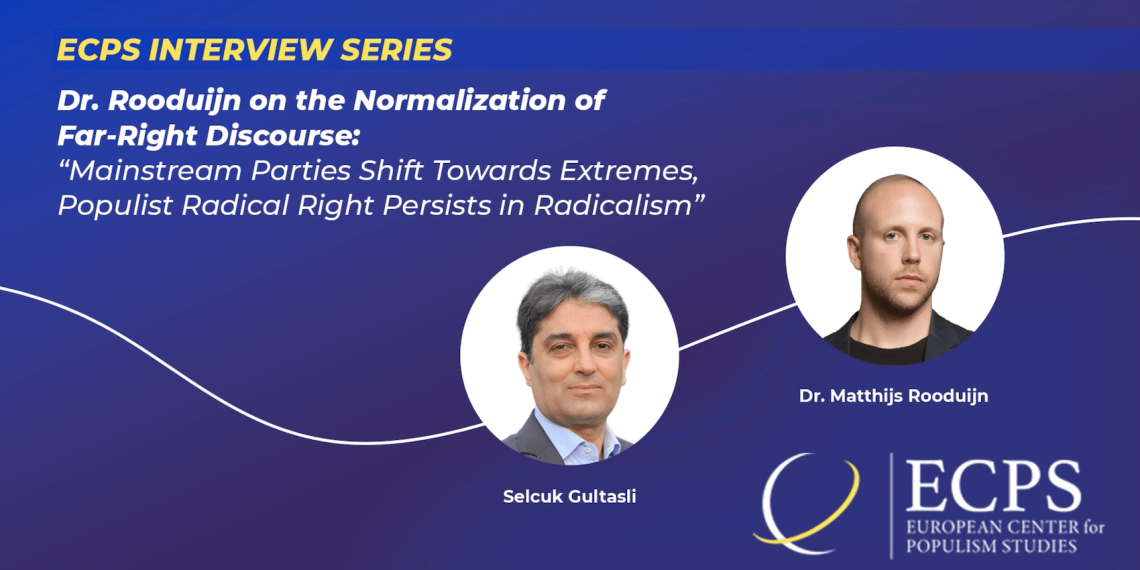In examining the unexpected triumph of populist radical right leader Geert Wilders in the Dutch elections on November 22, Professor Matthijs Rooduijn highlights a noteworthy shift within mainstream parties. He notes their increasing embrace of more radical positions, which challenges the prevailing notion of substantial moderation within populist radical right parties. Delving into the narratives of prominent populist radical right figures like Wilders and Marine Le Pen, Professor Rooduijn contends that the observed changes are primarily stylistic rather than indicative of fundamental shifts in political programs.
Interview by Selcuk Gultasli
In an exclusive interview with the European Center for Populism Studies (ECPS), Dr. Matthijs Rooduijn, Associate Professor in the Department of Political Science at the University of Amsterdam, provides insights into the normalization of far-right discourse globally, particularly in the wake of the surprising election results in the Netherlands on November 22, 2023. Dr. Rooduijn underscores a significant transformation within mainstream parties, as they increasingly adopt more radical positions, challenging the prevailing notion of substantive moderation within populist radical right parties. Examining into the narratives of prominent figures such as Geert Wilders and Marine Le Pen, he argues that observed changes are primarily stylistic, rather than representing fundamental shifts in political programs.
Delving into the complexities of populist radical right movements, particularly in the Netherlands, Dr. Rooduijn identifies nativism as the core feature, following Cas Mudde’s definition. Nativism, characterized by exclusionary nationalism, manifests in various expressions such as antisemitism, Islamophobia, anti-immigration attitudes and racism. The interview provides insights into how Wilders’ anti-Islam agenda fits into the broader narrative of populist radical right ideologies.
Examining the international landscape, Dr. Rooduijn explores both the similarities and differences between populist radical right movements in the Netherlands and other European countries. While leadership may vary, the core ideology resonates with a significant portion of the electorate holding right-leaning cultural views. The interview scrutinizes the normalization of far-right discourse in the Netherlands, highlighting shifts in public perception and electoral strategies. Dr. Rooduijn notes the adaptation of mainstream right parties towards the radical right, contributing to the observed normalization globally.
The discussion extends to Wilders’ stance on immigration, distinguishing his emphasis on Islam from other far-right parties. Dr. Rooduijn provides insights into the intertwining of civilizational populism, nationalism, and their resonance with the Dutch public. The interview further explores the relationship between populism and Euroscepticism in Dutch politics, emphasizing Wilders’ hard-Eurosceptic position and its significance in the broader European context.
Dr. Rooduijn sheds light on the role of social media in the success and visibility of populist radical right parties, acknowledging its transformative impact on political communication. Analyzing the recent Dutch elections on November 22nd, he highlights the unexpected shift in the political landscape and underscores the challenges in forming a government coalition.
Looking forward to the European Parliament elections in June 2024, Dr. Rooduijn expresses concern about the potential surge of populist parties, emphasizing the discordance between their ideas and liberal democratic principles. The interview concludes by addressing the challenges faced by populist radical right movements in maintaining long-term political relevance, particularly the stigma associated with Wilders’ party and its impact on recruiting candidates for political positions.


